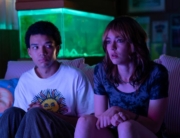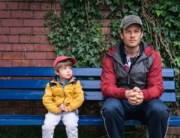

I’ve seen a lot of coming-of-age films and movies of rock stars going down a dark path, but one about a young British rock critic? That’s new. How to Build a Girl, adapted from British journalist Caitlin Moran’s semi-autobiographical novel, is a fun and breezy comedy carried to the finish line by another endearing performance from Beanie Feldstein. It doesn’t exactly do anything new genre-wise, nor does it feel as poignant compared to Feldstein’s work in last year’s Booksmart. Yet the film does enough with a standard formula to feel engaging and funny, which works to its advantage.
Feldstein plays Johanna Morrigan, Moran’s 16-year-old stand-in from 1993. She’s an aspiring writer from Wolverhampton, England, uncertain of what to pursue but eagerly holding onto dreams of changing the world with her penmanship. At the moment, however, Johanna remains unnoticed by peers and lives in a small house with her mom (Sarah Solemani), multiple brothers, and a dad (Paddy Considine) yearning to relive his musical heydays. Aside from one school friend, her closest confidants aren’t even real but rather bedroom wall photos of a wide-range of figures such as Sigmund Freud, Julie Andrews, and Jo March that “talk” to her, like the paintings at Hogwarts. These interactions function as moral support and a clever source of comedic relief as well.
After a major screw-up on live TV, Johanna’s do-over comes in the form of a newspaper ad from the D&ME rock rag looking for a music journalist. Despite having no prior experience with the genre, she lands an interview. It doesn’t start out pleasantly: she’s humiliated upon learning that the staff brought her in as part of a bet that this applicant who wrote about “Tomorrow” from Annie wasn’t real. Still, Johanna musters up the courage to demand the job and, upon attending her first concert, becomes enamored with rock and roll. So much so that she dyes her hair red and adopts a new wardrobe and top hat based on the DC comic character Zatanna Zatara to fit her critic pen name: Dolly Wilde.
Johanna does well at first, but it’s when she asks to write longer articles that the dark side of the critic industry—and Dolly—begins to take hold. Interviewing singer John Kite (Game of Thrones’ Alfie Allen) during his tour in Dublin isn’t that bad. On the contrary, he’s a real sweetheart. Yet her mushy article is too nice compared to what D&ME wants: put-down pieces that, as one of Johanna’s co-workers (Frank Dillane) explains, help weed out the musical wannabes. “Fan or hack,” is her ultimatum, and Johanna chooses the latter, reinventing Dolly as a biting, cold-hearted commentator whose jibes feel like a cross between Miranda Priestly and Pauline Kael.
Admittedly, I’m impressed that the movie waits until well into its midway point before giving us a montage, always essential to explaining a character’s inexplicable rise to fame. The film implies that it takes place over a couple of months, but it’s hard to determine the second act’s exact chronology, which is unfortunately where things turn formulaic. By this point, Dolly has garnered so much fame that Johanna’s critic persona begins leaking into her personal life as she cruelly lashes out at teachers and family members who’ve been there for her from the start—a common “pride before the fall” scenario. Not to mention it’s a bit eye-raising that these antics, complete with a shocking amount of implied sexual activity for someone underage, aren’t met with a degree of oversight.
Still, these issues won’t hinder the viewing experience. The movie is still a solid coming-of-age dramedy. The comedy is more chuckle-worthy than gut-busting, with a mix of verbal jokes and Office-style cringe moments. Feldstein casually conveys Johanna’s wit and fears across a number of scenarios, both solo and in an industry dominated by sexist practices. Arguably my favorite reaction moment involves one of Johanna’s co-workers asking her to sit on his lap to discuss a job, clearly expecting some sexualized exploits. Instead, she turns the tables by bouncing up and down on his lap like a hopper ball until he bails on the advances. Agency by an unorthodox method, if there ever was one.
There’s an earnestness to How to Build a Girl that makes it hard to dislike, even if it lacks some more novel ideas in its back half. With the world practically locked under quarantine and this film set for a VOD release, why not give this one a go? It’s as fun as listening to a classic Rolling Stones song.






Leave A Comment